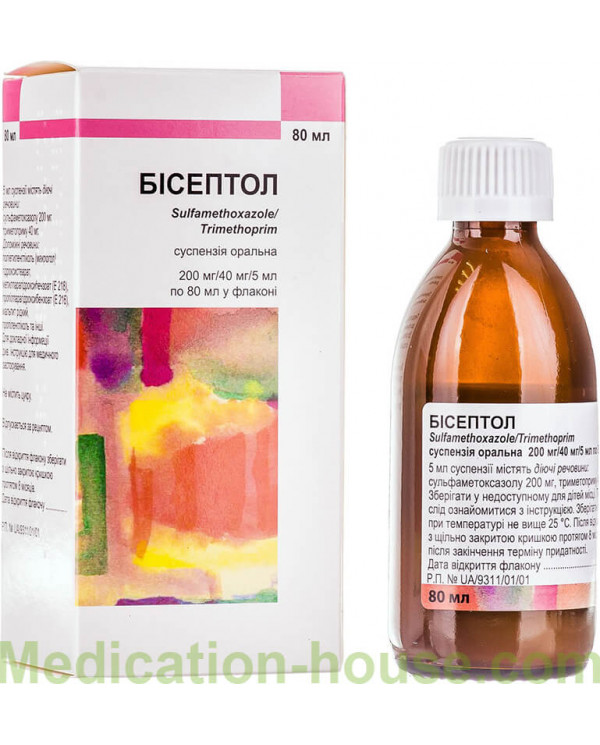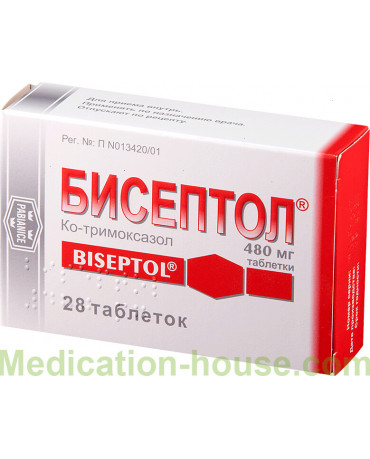Biseptol suspension instruction
You can buy Biseptol suspension here
The main component, co-trimoxazole, is a combination of sulfamethoxazole and trimethoprim. Pharmacological affiliation of the drug - sulfonamides. Antibiotic active against:
staphylococci, streptococci, meningococci, gonococci, E. coli, salmonella, cholera vibrio, anthrax pathogen, hemophilic bacillus and other gram-positive and gram-negative bacteria;
Plasmodium and Toxoplasma of the simplest;
pathogenic fungi of the genus Actinomycetes, Coccidioids, Histoplasm and Leishmania.
The mechanism of action is based on the double inhibition of the vital activity of pathogenic microorganisms. Sulfamethoxazole is similar in structure to a vitamin-like substance (PABA), which the microbe needs for normal growth and reproduction. Therefore, sulfanilamide is incorporated into the bacterial cell and prevents its further growth. Trimethoprim acts on the processes of fermentation and the synthesis of acids and bases needed by microbes, and inhibits their growth and development.
Release form and composition
Biseptol is available in pill and suspension form. Suspension is available in a volume of 80 ml, in a bottle of dark glass. The manufacturer of the drug Medana Pharma TERPOL Group J.S., Co, Poland.
The composition of the 5 ml suspension includes:
sulfamethoxazole - 200 mg;
trimethoprim - 40 mg;
various excipients.
The drug belongs to antimicrobial agents, is made from chemical raw materials, dispensed by a doctor's prescription.
Indications for use
Indications for use of Biseptol suspension are infections caused by bacteria and protozoa or fungal infections from:
respiratory system: bronchitis, empyema, pulmonary abscess, pneumonia, bronchiectasis;
urinary system: inflammation of the urethra, cystitis, pyelitis, pyelonephritis;
male reproductive system: prostatitis, inflammation of the appendages of the testicles;
genital tract: gonorrhea, chancroid, venereal inguinal and lymphogranuloma;
digestive tract: bacterial diarrhea, shigellosis, cholera, typhoid fever and paratyphoid fever, inflammation of the mucous membrane of the stomach and intestines;
liver and gallbladder: inflammation of the gallbladder, cholangitis;
skin and soft tissues: acne, boils, pyoderma, erysipelas, infected wounds and suppurations;
ENT organs: otitis media, sinusitis, laryngitis;
nervous system: inflammation of the membranes or abscess of the brain;
other: septicemia, brucellosis, blastomycosis, malaria, toxoplasmosis.
Contraindications for Biseptol suspension
hypersensitivity to the active components of the drug or excipients, as well as other sulfonamides;
kidney or liver failure;
severe blood disorders (anemia, agranulocytosis, leukopenia, especially associated with folate deficiency);
glucose fermentopathy;
gestation period;
lactation;
for suspension children up to 2 months;
Restrictions on the use of the drug are folic acid deficiency in the body, severe thyroid disease and bronchial asthma.
Mode of application
Suspension is taken after eating inside. It does not contain sugar, has a pleasant strawberry flavor.
For the treatment of infection in adults and children from the age of 12, they are prescribed a suspension of 20 ml every 12 hours, for severe infections, the dose can be increased to 30 ml. The average course of treatment is from 10 to 14 days.
Infants from 1.5-2 to 5 months are given 2.5 ml each, from 6 months to 5 years old - 5 ml each, from 6 to 12 years old - 10 ml every 12 hours.
The drug should be administered exclusively by a doctor due to the presence of a large number of possible side effects. Depending on the type of pathogen and severity of the infection process, the dosage and duration of administration may vary at the discretion of the physician.
Side effects of Biseptol suspension
Most often, Biseptol suspension is well tolerated. The following side effects are not excluded:
central and peripheral nervous system: headache, dizziness, rarely possible inflammation of the membranes of the brain, depression, inflammation of peripheral nerves;
broncho-pulmonary system: bronchospasm, choking attack, cough, inflammatory thickening in the lungs;
digestive tract: nausea, vomiting, loss of appetite, inflammation of the stomach, pancreas or intestines, pain in the abdomen;
hepatobiliary system: elevated liver enzymes, impaired bile production or excretion, inflammation or necrosis of the liver;
hematopoietic system: a decrease in the level of leukocytes, neutrophils, platelets, granulocytes, various types of anemia, increased levels of eosinophils, and others;
kidneys and urinary tract: inflammation of the kidneys, their dysfunction, the appearance in the urine of erythrocytes, salts, an increased amount of urea, creatinine, a decrease in urine output or the absence of urination caused by toxic kidney damage;
musculoskeletal system: pains in joints and muscles;
hypersensitivity reactions in the form of itching, rashes, flushing, various dermatitis, angioedema;
others: decrease in the level of glucose and sodium in the blood, increase in the level of potassium.
special instructions
with a lack of folate or a tendency to hypersensitivity reactions, Biseptol suspension must be used with caution;
with prolonged therapy, careful monitoring of the blood condition is necessary;
in old age or suspicion of folate deficiency even before the start of treatment, it is necessary to use drug very carefully;
when conducting long-term therapy or prescribing the drug in high doses, folic acid preparations can be used;
the likelihood of an adverse effect of the antibiotic increases when the excretory function of the kidneys and the bladder is disturbed;
against the background of the use of the drug, it is not recommended to use some products that can reduce its effectiveness, for example, cauliflower, beans, spinach, as well as tomatoes and carrots;
it is not recommended to be much in the sun and under ultraviolet rays;
in patients with acquired immunodeficiency syndrome, the occurrence of side effects may be more frequent;
It is not advisable to prescribe a drug for inflammation of the tonsils or pharyngeal mucosa with lesions of certain types of streptococci, since its strains have a high resistance to suspension Biseptol.
Drug interactions
with simultaneous use with some diuretic drugs may decrease blood platelets, which increases the tendency to bleeding;
when using anticoagulants, hypoglycemic agents and methotrexate, Biseptol suspension increases their effectiveness;
local anesthetics and other substances involved in the synthesis of PABK reduce the effect of the antibiotic;
Phenytoin and barbituric acid derivatives increase folate deficiency;
salicylates enhance the antibacterial effect of suspension Biseptol;
Vitamin C and other urine acidity agents increase the risk of increased salt levels in the urine;
elderly patients may experience an increase in the content of digoxin in the blood serum;
hypocholesterolemic agents (colestiramine) reduce the absorption of the antibiotic;
the drug reduces the hormonal activity of oral contraceptives, and therefore their effectiveness decreases.
Terms and conditions of storage
Shelf life of antibiotic 5 years. Storage should be out of reach of children, the temperature should not exceed 25 degrees. Application after the expiration date is prohibited.
Reviews
Olga
It seems to me that now the Biseptol suspension has become even better to help than before, maybe because it was not prescribed for a long time, the bacteria have lost the habit. I took it from cystitis, the effect manifested itself on the third day of administration. With monural it is not possible to compare, of course, but it still helped well.
Terms of sell
You don't need a prescription to buy Biseptol suspension.


